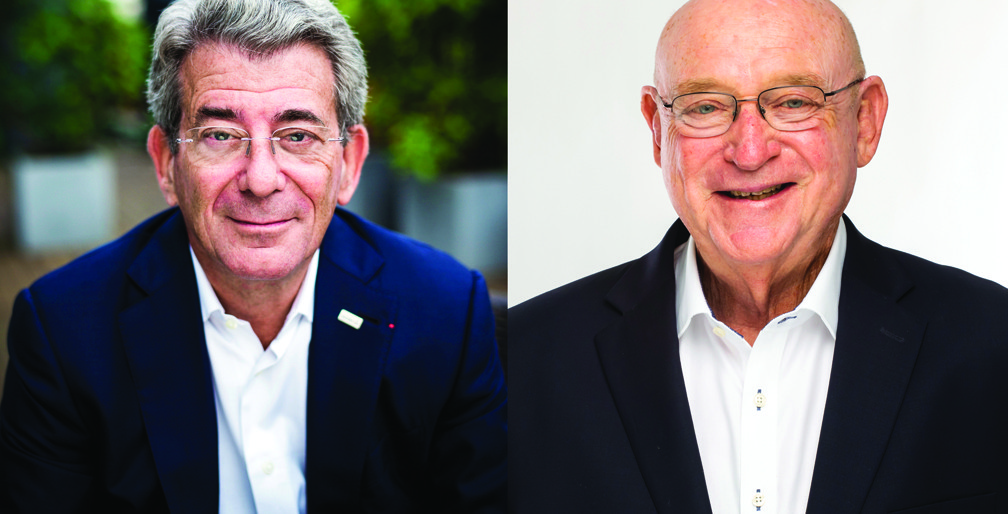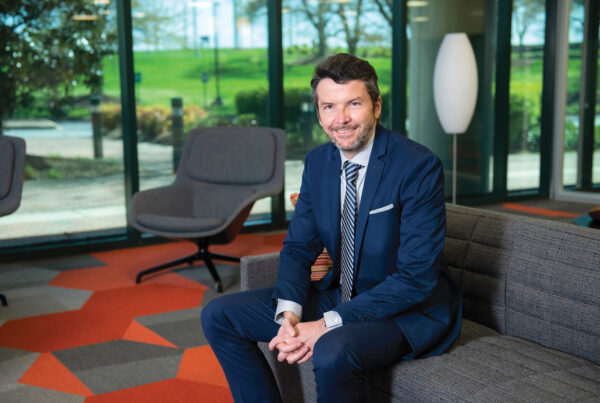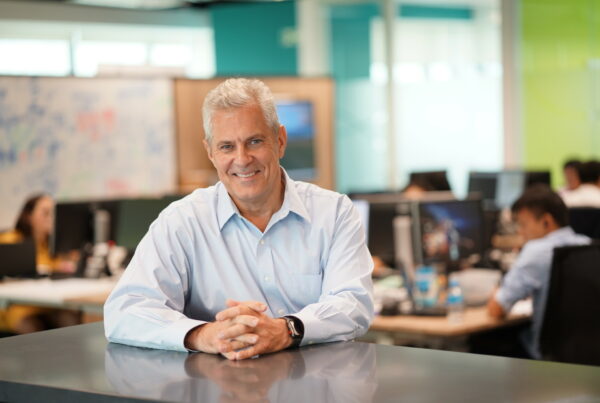To help modern chief executives reflect on their path forward and the possibilities ahead, the stories in our CEO Master Class series share lessons learned and frank advice from some of the world’s most accomplished business leaders. For this second installment, we sat down with Michel Landel, former CEO and board member of Sodexo Group, and Air Force veteran Bill Boisture, former chairman and CEO of aviation icon Hawker Beechcraft. (In our first installment, we sat down with Ajay Banga, John Sculley and Maggie Wilderotter.)
Insigniam Quarterly: As you’re hoping to influence future executives, how did your leadership style evolve over the course of your career?
Mr. Landel: From the time I became a CEO until now, the world changed drastically. Nevertheless, I believe that there are leadership fundamentals that will always be highly relevant, such as leading by example, as well as being authentic and transparent. Leading isn’t always about making decisions, but rather asking the right question and leveraging the collective intelligence of the organization to find the answer. Most of the time, people and teams can find answers and make decisions autonomously. Over time, I came to know myself better, and learned from my mistakes. I believe this is how you progress—and ultimately become a better leader.
Mr. Boisture: Well, that’s a good question. Early on with SimuFlite, Skyworld and Butler Aviation, those were highly dependent on being able to articulate change based off just a knowledge of the functions, and being able to get people to understand what needed to be changed and how we were going to do that. Somewhere in there I started to develop the whole idea of one of the central value propositions in the enterprise. How do you articulate those, first of all, to your people, and second, to your customers? How do you begin leading not only on functional expertise, but on having an idea about where you want to take the enterprise?
“It is very critical to know yourself well, and this is something that you have to work on. It’s not obvious. Also, never overestimate yourself. That’s my conviction. You really have to be who you are. The CEO is not a role, it’s a job.” —Michel Landel
IQ: You’ve undoubtedly seen plenty of examples throughout your career of peers or colleagues who maybe had challenges evolving with the times, or just didn’t have the same level of self-awareness that you do about needing to adapt and evolve. How would you emphasize to leaders who are growing into their roles the importance of being flexible?
Mr. Landel: As a leader, you must always have convictions and be passionate. But today, the world is changing so rapidly and significantly that you can’t have certitudes; you must accept that which you don’t know and never overestimate yourself or your opinion. That, of course, is not always so easy. As a CEO, you can’t play a role, you have to be who you are as a human being. So, I believe you can’t ever stop working on your own development to continuously improve your knowledge of yourself. When you become a CEO, you must remain focused on your life’s purpose, your values, and be consistent with them. Have the humility to say, “I don’t know” or “I made a mistake.” Too often CEOs believe that just because they are at the helm, they should know everything, which is a big mistake. Most of the time the executives—and more extensively, people within the company—will have the right answers. So again, CEOs don’t make decisions as much as they ask the right questions.
Mr. Boisture: Actually, innovation in aerospace is dramatic when it happens, but its long leads and cycle time change because there’s so much complexity and because of the regulatory environment. Things come out of the future slowly. But you have to adapt to it and decide whether the technology that is being developed is going to really add value, or is it just not applicable to the aviation enterprises that you’re working on. There’s a mix of both. I think it’s a fairly easy industry to keep up with what’s changing or what’s new. If I think about some of the other industries—the digital world or pharmaceuticals—it seems like you can wake up one day and be years behind. What the aerospace industry requires is when you place a bet it’s got to be a five- to 10-year bet that you’re setting the company up for success, and that the product you’re investing in will be unique enough to sustain the competitive enterprise.
IQ: Tell us about the success you’ve achieved that others point to, that perhaps defines your career. What success means the most to you as a person, a leader—that left you with the greatest sense of satisfaction as you look back?
Mr. Landel: During a career of CEO or leader, you don’t always have the right team in place at the right time, perfectly aligned behind the same purpose and the same goal. From my experience, it’s actually rather rare. Obviously, when you have the right team the results are generally favorable: Motivation within the teams is high, people are happy and consequently clients and customers are happy and shareholders as well. This combination of finding the right talent, the right balance within a team, is complex. I think it’s one of the most difficult things to do when you are a leader, building the right team at the right time. Of course, it’s not an exact science—it’s very fragile and things can change overnight. For me, finding the right balance is the biggest success you can have as a CEO. It is fun, motivating and extremely engaging. Fortunately, it has happened several times in my career
Mr. Boisture: Things that we started around the Gulfstream product when I was there have stood the test of time and allowed Gulfstream to become essentially a preeminent maker of large-cabin, long-range airplanes. We started doing two fundamental things. Instead of just building the air frame and letting a third party complete it with the interior and the paint and everything, we decided to invest and to do that ourselves. So we had control of the quality and the integration of the entire product. The second major innovation involved our very small service operation. Service and support were not core to the company’s business in the early ’90s. We decided to make it so. We started to be protective of our technical data and pay attention to the levels of spares and parts that we carried so we could support the fleet. That grew from probably a half-million-dollar business in ’95 to close to a $2 billion business today. You learn from those you work with. One of the things that an early mentor showed me was the value of intense listening. He was a Socratic leader in that he taught by asking questions. And those were two fundamental things that I thought really made effective leadership. I think that affected my style for a long time; I didn’t have any of the particular technical depth of the disciplines that we were involved in, but I had an overall understanding of how they fit together. So learning to listen to the experts in various fields and then balancing or integrating the input into something we could work with, seemed to be an important leadership trait.
IQ: What are some things that you can’t appreciate or learn until you’ve sat in that CEO’s seat?
Mr. Landel: I am not sure, but obviously when you’re in the top job, sometimes you can feel alone. In fact, you are never alone—you have leaders within the company that you trust and a network of advisors and colleagues you trust in different parts of the world. When facing challenging decisions, the circle of trust, if you will, gets smaller the higher you rise in your career, and trust can be fragile. This is why you have to build confidence in yourself and maintain it by constantly working to know yourself better and understand your strengths, weaknesses, doubts and limits.
Mr. Boisture: You don’t realize, first of all, how much you are served and how much people pay attention to what you do, what you don’t do, where you go and where you don’t go. So there’s a fish bowl aspect of it that you’re not prepared for. You have to really become aware of it. It’s very important to large groups of people because they don’t necessarily have daily contact with you and they’re looking for clues about what’s going to happen as a company. That’s something you don’t really know about until you’ve experienced it. That was particularly true during Hawker Beechcraft’s run-up to filing Chapter 11 and doing a preplanned bankruptcy. That’s a very disconcerting time for any workforce and any employee. So they really do look to the leaders to assure them somehow that we’re going to get through this, and they watch what you’re doing pretty closely.
“The aerospace industry requires that when you place a bet, it’s got to be a five- or 10-year bet that you’re setting the company up for success, and that the product you’re investing in will be unique enough to sustain the competitive enterprise.” —Bill Boisture
IQ: Are there personal skills or qualities—such as perseverance and resilience—that you have to call on, especially when you’re going through something like a [bankruptcy] and taking care of the people that, as you said, could be very concerned about the future?
Mr. Boisture: Focus. I probably couldn’t tell you what else went on in the world in 2012 and 2013. So you focus. You have to explain to the court what you want to do with the enterprise, and you’re trying to make sure that the picture you paint is one that the people in the company understand and can execute. And you actually begin executing the restructuring and the recovery well before you come out of court protection. You have a period of time where, as the leader, you have to articulate day in and day out: It will work and here’s why. You’re really focused, and there’s a hard-headed perseverance because there are setbacks along the way. In the early stages, people all want to read the last page of the book. You can’t do that, but you have to start writing the book and be clear about what’s going to happen.
IQ: What happens to the culture of a company when it’s going through an event like [bankruptcy]? How are you pulling the levers to keep people focused on the tasks at hand when there’s this big existential threat that they’re worried about all the time?
Mr. Boisture: The process causes you to evaluate across a broad spectrum of activities—in our case because we were building many different kinds of airplanes. Evaluate the potential of your various products that can actually be manufactured and supported profitably post-bankruptcy. Then paint a picture of what the emerged company will look like. Do it with enough clarity and real understanding of the markets, the products and the competition so the people in the company say, “Well, I may not like all the decisions you’re making, but I understand them.”
In our case, we had a union involved. It was necessary to articulate to them the number of jobs we expected to have when we emerged from protection of the court, what our relationship with them needed to be and what our wage structure needed to look like in order to be competitive as a restructured company. You have to articulate all those things to different audiences within the company. And in our case, that meant bringing the company together around its legacy name and products, which were Beechcraft products. And the employees all knew with a great deal of pride that they were well-made products and that the market liked them. So it was a way for them to see that that made sense.
IQ: How do you find top talent and assemble high-performing teams? When you’re looking to bring talent into an organization and really cultivate these teams, what are the benchmarks you use to make sure you’re putting the right person in the right role?
Mr. Landel: I think the fundamental thing is to have people who share at least similar values and who have some sort of personal generosity and genuinely respect differences. Diversity in a broad sense—whether it’s diversity of gender, thinking, country of origin, culture or background—is fundamental within a team to stimulate innovation, creativity and collaboration. Beyond that, it’s the ability of these different people to live together and to truly respect each other. So building a successful team where people share the same purpose, and trust and support each other takes a lot of time, a lot of work and in fact it never stops; you must constantly work on it, adapt, manage conflicts, susceptibilities, changes and egos.
IQ: Any recommendations or advice to share with CEOs growing into their career, or folks who aspire to that level of leadership?
Mr. Landel: Being a CEO is not playing a role. Being a CEO is being yourself—with your strengths, your weaknesses, your doubts, your questions, being respectful of others, and being open and interested by the diversity of the world. Your role is really to leverage the intelligence of the company, and you need the right collaborative people in the organization who understand that.
This article appeared in the Fall 2021 issue of Insigniam Quarterly. To begin receiving IQ, go here.






